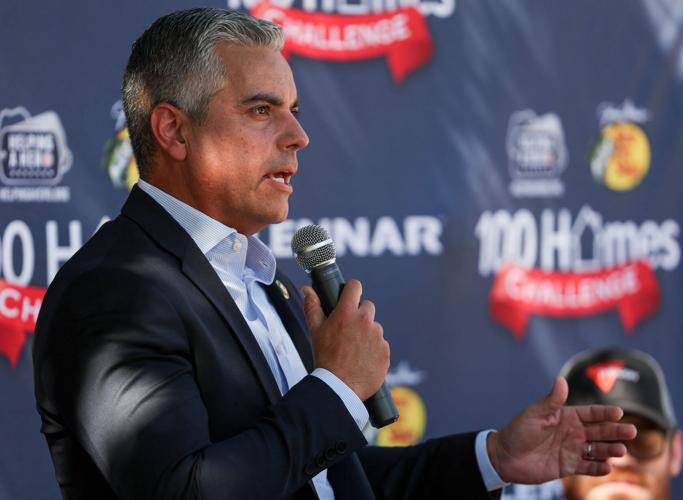More than $250 million poured into Arizona’s contests for the U.S. Senate and House.
After all the ads, mailers, phone calls and rallies, not a single seat flipped — proving, experts said, that money isn’t everything in politics.
The Senate race between Democratic Rep. Ruben Gallego and Republican Kari Lake, a former news anchor, drew the bulk of that spending — $156 million, according to OpenSecrets, a group that tracks campaign spending.
Gallego and his allies outspent the other side more than 2-1. He won by nearly 81,000 votes, or 2.4 percentage points.
“It’s an arms race,” said Ian Vandewalker, senior counsel with the Brennan Center for Justice at New York University who studied this year’s Arizona elections.
By the end, national Republicans closed the spigot as Lake’s support consistently lagged that of former President Donald Trump — a strategic decision that let Republicans spend their money in more competitive states.
“The Senate race did attract less money in Kari Lake’s favor than people may have thought given that it is a battleground,” Vandewalker said.
Arizona’s Senate race was one the most expensive in the nation, though well below the all-time record set this year in Ohio — $421 million, and likely closer to a half-billion once the final bills come in.
The 2020 Senate race for an open seat was Arizona’s costliest, at roughly $258 million, campaign records show. Spending dipped to $228 million in 2022. Democratic Sen. Mark Kelly won both races.
Gallego will replace one-term Sen. Kyrsten Sinema, an independent who was elected as a Democrat and still caucuses with that party. Her 2018 race drew $118 million.
Even if Democrats “overspent in the Senate race, it was worth it because they got that seat,” said Matthew Foster, who teaches government at American University.
Republicans ended up taking control of the Senate 53-47, but Democrats were eager to save every seat they could in a bad year.
Overall, Democrats outraised Republicans about $83 million to $45 million in the Arizona Senate and House races, according to Federal Election Commission data.
Outside groups spent another $130 million, according to OpenSecrets.
Gallego far outperformed Vice President Kamala Harris.
Analysts largely credit Lake, an outspoken denier of Trump’s 2020 defeat who has yet to concede her own 2022 gubernatorial race. She alienated many mainstream Republicans by pushing out a popular state party chairman and by insulting supporters of the late Sen. John McCain.
“Some voters are not completely averse to splitting tickets if the candidate is a quality candidate,” Foster said. “Kari Lake was deeply flawed. … The Senate race really exemplifies how important candidate quality is.”
Most of the state’s nine U.S. House districts are strongholds for one party or the other. Republicans went into Election Day 2024 with six of the seats and emerged with the same number.

Most of the Arizona's nine U.S. House districts are strongholds for one party or the other. The most competitive of those races this election was a rematch between first-term Rep. Juan Ciscomani, R-Tucson, and former state Sen. Kirsten Engel. Each side poured more than $18 million into the battleground district, campaign records show. Ciscomani won by about 11,000 votes.
The most competitive of those was a rematch between first-term Rep. Juan Ciscomani, R-Tucson, and former state Sen. Kirsten Engel.
Each side poured more than $18 million into the battleground district, campaign records show.
Ciscomani won by about 11,000 votes — a far bigger margin than two years earlier and a major disappointment to Democrats, who were scrounging for enough wins to retake the House.
That was the only district ranked as a true toss-up by analysts such as the Cook Political Report, though Democrats also went after Rep. David Schweikert, R-Fountain Hills.
His race drew more than $25 million between candidate committees and outside groups. With Trump adding momentum to the GOP side, Schweikert defeated Democrat Amish Shah 52-48 — the margin topped 16,500 votes — to win his 8th term, despite the challenger’s $2.1 million edge.
When each side sees victory within reach, Vandewalker said, “neither side is going to back down,” and both will “spend as much as they can to win.”
In Phoenix, Rep. Greg Stanton, a Democrat and a former mayor, fended off Republican Kelly Cooper by a 7-point spread to secure a fourth term. That race attracted little outside attention, and the incumbent held a 4-1 financial edge.
Most of the House races weren’t close. In most, the candidate with more money won.
Gallego’s successor, Democrat Yassamin Ansari, outspent a challenger 10-1 and scored a 44-point landslide.
Republican newcomer Abe Hamadeh held a 6-1 fundraising edge in the district where Rep. Debbie Lesko, R-Peoria, is retiring. He sailed to victory by 13 percentage points — two years after he lost a bid for state attorney general to Democrat Kris Mayes by about 500 votes.






